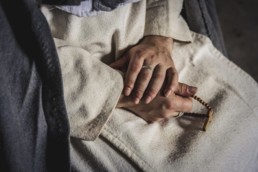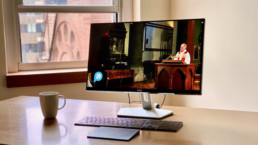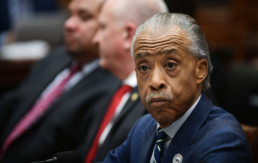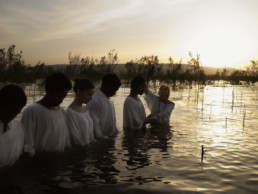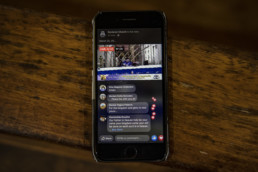A Shelter in the Bronx Where the Homeless and the Friars Shelter Together
A version of this story was published in Religion News Service
A Shelter in the Bronx Where the Homeless and the Friars Shelter Together
Zoé Chevalier | zc2504@columbia.edu
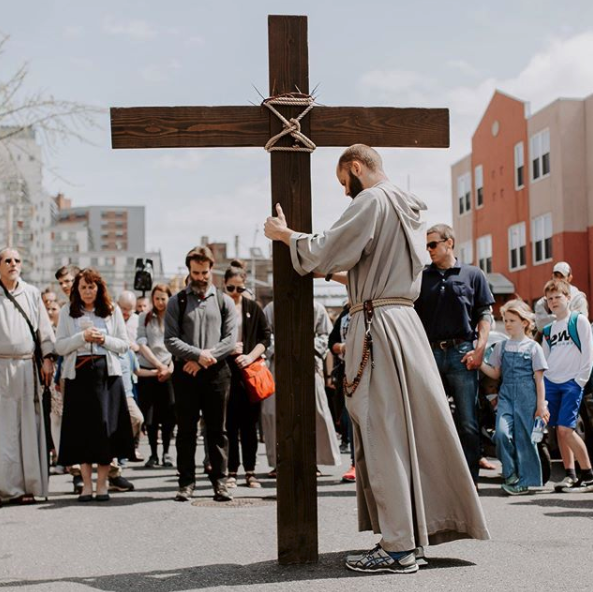
On a sunny spring afternoon, a dozen men stand around a cornhole game. The excitement is palpable. On a video of the event, they are laughing, screaming and high-fiving each other while a loudspeaker projects the voice of the organizer. The video slows down to enjoy the gripping moment when the bean bag-like object enters the goal. Points are scored. The excitement builds. Things seem normal. But upon closer look, this group of friends consists of two very different populations: Franciscan friars, in their traditional grey habit, and homeless men.
The video was shot in mid-April by one of the missionaries at the Saint Anthony Shelter for Renewal on East 156th Street in the South Bronx. The game takes place in the courtyard area of the complex that was once a Catholic school. It has been transformed to host two friaries (St. Crispin and Our Lady of the Angels), a homeless shelter, a youth center and an auditorium. Friars and guests live in a community with each other, but the COVID-induced quarantine has intertwined their lives more than ever.
The men gathered at St. Anthony’s are an unusual response to the COVID-19 pandemic. The friars have chosen to be close to the men they serve, in effect quarantine with them until the danger passes. While they share meals, prayers and recreation, they do their best to maintain social distancing rules.
It has been something of an adjustment, both for the friars and for the homeless men. The friars have to contend with serving three meals a day, and keeping the shelter running around the clock. The guests have had to follow strict rules about drugs, alcohol and even bedtime. In the process, they have become a community.
“It’s been a challenge for them and for us, but there is a feeling that we are all in this together,” says Father John-Mary, one of the friars.
***
The Saint Anthony shelter is part of the Franciscan Friars of the Renewal, a community that was founded in the Bronx in 1987 by Benedict Groeschel and seven others. As Catholics, the friars follow the direction of the Pope, and their main values are those of poverty, chastity and obedience. But the friars distinguish themselves by continuing the tradition of St. Francis of Assisi, known for his life of penance, charity and solitude.
“We live things a little more intentionally or intensely,” says another member of the friary, Father Mark-Mary. The friars devote themselves to a life of poverty, living in the hardest neighborhoods, begging for food and depending on donations for survival. They have no personal bank accounts, little technology and devote themselves to serving the poorest. If a neighborhood got “too nice,” the friars are asked to leave to a more impoverished community, according to Mark-Mary.
The friars believe in a hands-on approach to helping the poor. “The Gospel tells us to take care of our neighbor,” says John-Mary, adding that he believes in the approach of “Give them a sandwich, not just a blessing.”
This Franciscan order has 15 friaries and about 140 friars around the world, including Ireland, Nicaragua and Honduras. At the St. Crispin Friary in the Bronx, where the shelter is located, there are about 10 friars, 20 missionaries, volunteers who come to live in the community for a year, and 30 guests, in need of shelter. It is hard to get an exact number because the friars seem to live in a number-free community, there are no limits on how many friars can join, there will always be room for one more.
***
Father Mark-Mary, has been with the community for 11 years, and although he lives in the other friary, Our Lady of the Angels, he now has to help out at the shelter. Mark-Mary is usually in charge of a youth program, teaching catechism to children of the neighborhood, but since the pandemic started, the complex closed its door to the outside, and the classes transitioned to Zoom. Now, he works one day a week at the shelter.
His interest in the Franciscan order came in a rather unexpected way. One night as a teenager in Orange County, California, where he grew up, Mark-Mary says he was eating at In'n'out Burger, a classic fast-food chain in California when a young man approached him and started talking about this unusual order. He was talking about “hard-core Franciscans who sleep on the ground,” said Mark-Mary, and his interest was piqued. Fresh out of college, Father Mark-Mary came to join the friary.
Joining the order is a serious process. First, the applicant does a few phone interviews with the friars, in order to assess his interest. The next step is to come visit. Once a month pre-quarantine, the friars would welcome the potential new recruits for an introduction into the friar's life. In May, applicants are invited to stay for a couple of weeks, in which they are required to take a psychological exam, to make sure that they can take on a life of penitence and service.
Postulants then start in September for 10 months, after which they are allowed to leave or go on to Novitiate, during which they start wearing the habit and choose a religious name. Four years later are the final vows. The final step, if the new Friar wants to become a priest, is to study for another four years of seminary, after which they can be ordained.
***
This strict life is often very different from the one their guests live. The Friars pray together four to five hours a day, according to Father Mark-Mary, and most of their remaining time is spent serving others at the shelter, the food bank or the youth program that they run. There is often not much time for leisure, and the commitment is complete and life-long.
Before the quarantine, Jorge, one of the guests at the shelter, would spend his days walking around the neighborhood, take the subway downtown and go to WholeFoods, get a coffee, sit in the park and watch a movie, he would wait for the time to pass until he could get back to the shelter. Some other guests spent their days at the library, where they could watch movies on their phones or play chess together. Others would go to work or look for a job or apartment. Some had social workers meetings and programs to go to.
Every night, Jorge would take the mandatory breathalyzer, and drop his belongings in box 23. These were things like food and pills that were not allowed in the rooms, he also had to give away his phone, which stayed in the office for the night. The men’s belongings are often searched for drugs, alcohol, cigarettes, and any “risqué publications,” all forbidden according to John-Mary. Brother Patrick explained that “It is a catholic environment, guests are immersed in the norms of the community,” although they do not have to be catholic to be offered a room.
Jorge would then have dinner and activities with the men, and retreat to his room. At 9 p.m. the lights would go off and come back on at 5:30 a.m. the next day. Jorge is not a morning person, and having to do all his chores, shower, eat breakfast and be out the door by 6:45 was always a struggle. He would often forget his wallet behind.
These different lifestyles often clash. “I don’t like my freedom taken away from me,” says Jorge, laughingly, adding that he is very grateful the friars offered him a place to stay, and that “They are very strict but there is a reason why (...) I've never heard of a shelter like that.”
***
The shelter runs on order, discipline and a fine-tuned schedule. But now everything has changed. Having the men stay in around the clock while maintaining social distancing rules has been a challenge. The guests now eat in shifts, to avoid being all in the same room at the same time, they wear masks, and most importantly, are not allowed out of the complex.
Some rules have changed during the quarantine, so the men are allowed to have their phones during the day, and smoke in the little garden outside the shelter. Jorge used this opportunity to connect to his sister's Netflix to watch action movies and play games on his phone to avoid getting bored.
To occupy the guests, socially distanced movie nights are organized every other day, where they watch “family-friendly movies” found on Pureflix, a Christian version of Netflix.
The friars even buy guests cigarettes, but only three or four are allowed a day. Jorge, who just left the shelter to live with his mother, laughs during our interview: “I’ve already smoked three since we started talking!”
The shelter structures and discipline is good for him, Jorge thinks, but he also struggles with the added control exerted on him during the quarantine. Now he only gets out once a week for his medical visit, driven by one of the friars. Before leaving the complex, he had to explain why his appointment was necessary and let one of the friars speak with his doctor. “I didn’t sign up for that,” says Jorge. He was uncomfortable with his doctors learning that he was homeless.
***
Because of high demand, Jorge’s spot at the shelter was not easy to get, and he was willing to sacrifice some liberty in order to be part of this special community. When the quarantine started, he had already been there for five months but decided to stay at the shelter.
Jorge used to be a cook, but his life took a turn when he lost his job due to a disability that made it hard for him to walk and breathe. He would drop hot pans in the kitchen, shaking, he would put himself in danger, and was eventually fired. Without this income, he soon wasn't able to pay for rent, and his landlord decided to take him to court. Jorge packed his belongings in a big bag and left his Bronx apartment, where he had been living for the past 12 years with nowhere to go. He headed to 14th street and spent a week sleeping in a park, in the subway, or on a makeshift bed in front of the Salvation Army.
He relied on people he met on the streets to figure out his next move: “I had never been in this environment, I had never been homeless before,” he says. One day he met a man who told him about a shelter on Lafayette Street, he headed there and stayed a few nights. There he met another man, who had just come from the St Anthony shelter, and got kicked out because he started using again. There might be a free bed now he said, Jorge trekked to the Bronx to try.
At 6:30 p.m. every evening, men lined up at the door of the Saint Anthony Shelter for Renewal in the Bronx, coming back to one of the 30 beds available for the night. Some had been there since 9 a.m. to get one of the few openings when someone leaves, usually after a six months stay. When the doors opened, they were breathalyzed and had access to a bed, a hot dinner and breakfast. At 6:45 a.m. the next day they would be on their way in the streets of New York City, living their lives for 12 hours before curfew.
Jorge came five days in a row around 5 a.m., he wanted to be first in line in case a bed opened up. On the fifth day, there was an opening and after a negative breathalyzer, he was admitted. In the meantime, he heard that his friend who told him about St Anthony died of an overdose. “He was a good guy,” says Jorge, who himself had been clean for three months “I know what addiction does, ” he added, “I get high in my head and I end up alone, miserable, broke and unhappy.” The shelter provides solace from these problems and a place to reconnect with his Catholic upbringing.
***
Easter was not the most festive this year. Usually, all the friars from across the friaries get together and have a nice meal for Holy Thursday, this did not happen this year. Although the liturgy was the same, “it was all much simpler” said Father Mark-Mary. No flowers decorated the Church, and the doors were not open for Sunday mass. The music was much simpler too, without the usual 15 musicians who would usually come.
But despite their best efforts to avoid any outside interaction, COVID did not spare the friary. Michael Kearney, 23, a missionary has had to quarantine in his room for two weeks as he showed mild symptoms. In an interview, Kearney said that the biography of Mother Theresa, and the tomato soup and grilled cheese prepared by Jimmy, the cook, got him through. He also read the NY Times and watched a lot of Terrence Malick movies.
Five friars have had the virus, including Father Luis, the head of the shelter who Jorge describes as “the rock.” Two missionaries also showed symptoms. The six-floor of the friary has then been converted in a makeshift quarantine zone, where the men isolate and are brought meals three times a day.
Another source of worry was food supplies. The friary usually depends on a New Jersey Food Bank, but deliveries have stopped with the fear that their elderly drivers would be at risk. So others stepped in to deliver food.
Somehow Jimmy, the cook for the shelter always manages. “He’s the best,” says Jorge, adding that during the Holidays, thanks to a donation, all the men were treated to lobster tails and filet mignon. He still remembers it with emotion.
But the most heartbreaking to Father John was to see one of the volunteers who usually help out at the shelter come back to use the Food Bank for himself. After losing his job, he now needed the friars to support him, too.
***
Despite all this, the friars are keeping a hopeful attitude. Father Mark-Mary cited the long tradition of Franciscans serving and dying during plagues and says that it is expected to continue helping others. “We have given our life to suffer with those who are sick and vulnerable,” he says.
Jorge left the shelter a week ago and now lives with his mother in the Bronx. He missed being able to attend mass at the friary for Easter but enjoys the new found freedom he gets from walking around the neighborhood every day. He found a subsidized apartment and looks forward to moving in when the quarantine ends.
“I have been blessed,” says Jorge, who strengthened his Catholic faith at the shelter. “I speak to God in a normal basis, like he was a normal person.”
You can Zoom a Mass, but Confirmation will have to wait
A version of this story was published in Religion News Service
You can Zoom a Mass, but Confirmation will have to wait
Ricardo da Silva, S.J. | rd2920@columbia.edu
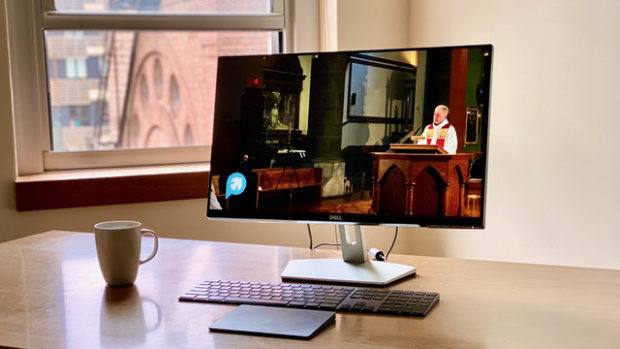
Since the beginning of February, a small group of Roman Catholic young adults has been meeting at the Church of St. Paul the Apostle in Manhattan, to prepare for the rite of Confirmation which they were to receive this Easter.
For the past three years, Emily da Silva-Prado, 25, had not managed to organize herself to attend Confirmation classes. When she enrolled this January, she was determined that by Easter 2020 she would be Confirmed.
But only a few weeks into da Silva-Prado’s instruction, the coronavirus would strike New York, shutting down all non-essential services in the city. Among these, religious institutions like St. Paul’s.
“To be honest with you, I just didn’t take it seriously for quite a while,” da Silva-Prado said, remembering her initial reaction to the public health crisis that has, now, crippled New York and much of the world.
But the unreality of the situation would quickly change for her.
“It got really real for me when we canceled class.”
Suddenly, the Sacrament da Silva-Prado had put off for three years, now deeply desired and had finally been preparing to receive, was left in the balance.
The Catechism of the Catholic Church teaches that during the celebration of the Sacrament of Confirmation, believers are “enriched with a special strength of the Holy Spirit” and become “true witnesses of Christ,” completing the grace they received during the Sacrament of Baptism, which most receive as a child.
Confirmation has its roots in both the Christian and Jewish traditions.
In the second chapter of the Acts of the Apostles in the Christian Bible, the disciples are gathered in Jerusalem during Pentecost, a word that stems from the Greek for “fifty.”
The scripture recounts how 50 days after the resurrection of Jesus from the dead and 50 days after the Jewish celebration of Passover — “a noise like a strong driving wind” entered the room where they were gathered and with it, “tongues as of fire which parted and came to rest on each one of them.” When this happened, the disciples “were all filled with the Holy Spirit and began to speak in different tongues, as the Spirit enabled them to proclaim.”
It is from this collective experience that the Christian community is said to have been born. In that instant — even though they spoke different languages — their common experience united them in understanding. That experience, Catholics say, is much like the status of their church today, a church that is spread across the world yet follows the same liturgical ritual and offers the same Sacraments to believers everywhere.
A first-generation American Brazilian, da Silva-Prado was raised Catholic. But as a teenager, when the time came for her to be confirmed, she had other things on her mind.
“This is full disclosure,” she said, looking down, her cheeks growing redder and redder. “It was more for a boy.”
She left the Catholic Church so that she could spend more time with her high school sweetheart.
As a young high schooler at the time, she reckoned she could fulfill both her desire to go to church and to be with her boyfriend, by going to his Brazilian Baptist church instead. Not long after, she encouraged her mother to join her — leaving her father to attend Catholic Mass on his own.
But two years ago, following a “conversion” trip to Italy, da Silva-Prado, who is an art historian and educator of ancient religious works at The Frick Collection, decided it was time to return to the church of her childhood.
“I don’t know,” she said, “When I was at the different churches; when I was in Rome; when I went to the Vatican — something happened where it just all made sense.” It was then that da Silva-Prado decided to begin Confirmation classes. But, short of two months in, with the coronavirus taking hold in New York, her class was quickly forced to find a new way to meet.
After the citywide shutdown, the priest teaching the class, the Rev. Paul Rospond, was determined to continue the program he began teaching at the parish center. “I can actually see the people’s faces on Zoom,” he said, laughing at a discovery that now seemed silly to him. “It took me a week to figure it out!”
Before the coronavirus hit — a time now jokingly referred to as time B.C. — the priest, who is 68 years old, had never taught a class on Zoom, the online video conferencing platform that allows people from all over to meet in a virtual room. “It’s a little more difficult,” he said. “You don’t get the same kind of rapport or feedback.” But, “I’m grateful that I have a way to continue, that gives me some hope that we’re finding ways to continue our ministry. That’s very important. Now, when people will get confirmed, who knows.”
“It’s a time where we really have no precedent,” said da Silva-Prado as she tried to make sense of the shape her faith would take in forced isolation from her community. “It’s been odd doing it through Zoom. It’s not like in-person where you can kind of be, ‘Oh wait, I didn’t quite get that’ or ‘Could you repeat that?’ or ‘Can we go a little bit further in-depth?’.
The new and somewhat stilted format of the class is proving especially difficult because this time has forced da Silva-Prado to think deeply and differently about her life, without the reassuring security net of personal face-to-face contact with a priest or her friends. “I think that this is a time where we’re being asked to take stock of our lives and really evaluate what’s important; what is not,” she said.
“What is that life in the church when we don’t have the physical building anymore?’”
She took a second to digest her question.
“I’ve never lived in a time where Church has been canceled — ever,” she added. “That’s just so scary and very frightening. You don’t know when it’s gonna come back.”
“We are participating through watching Mass online; watching Mass on television,” da Silva-Prado said. “But the physical Mass, I thought that I could attend forever and ever and ever — till kingdom come — is canceled.”
This time of forced introspection and self-quarantining is testing, but da Silva-Prado is confident “there will be an end to this,” she said. “It will be like the raising of Lazarus, that will be amazing and wonderful and miraculous.”
Still, she doesn’t want to avoid the pain nor lose sight of the seriousness this moment has called her to recognize. “There needs to be this death first,” she said, recalling the present unabating cycle of death taking place in New York. “There needs to be the weeping. And Jesus will weep with us and he’s there in our suffering as well. And I’m positive and I’m confident in that. I just think that it’s going to be longer than we expect.”
The prolonged wait to return to her church is only exacerbated by the indefinite wait to be Confirmed.
The Confirmation ceremony is usually presided over by the local bishop and involves an elaborate set of rituals. It is not something that can be done on Zoom.
In the traditional Confirmation ceremony, the bishop smears oil on the foreheads of those being confirmed and lays his hands on their heads. The ritual is meant as a sign that strengthens the faithful to persevere in the Catholic life and to serve as full-fledged members of the church. A strength upon which many now rely.
“The touch is important,” said Rospond. “The anointing with the oil is important; gathering together for the sacrament is important; the connection with a bishop is also important.”
For da Silva-Prado, her classmates and many who were expecting to be received formally into the Catholic Church this Easter — which last year in the United States were more than 37,000 people — they will have to wait indefinitely for a time when they can, again, gather inside churches. No date has been set for this year’s Confirmation.
But when it does come, da Silva-Prado said she will be ready. “I think that Confirmation is going to mean a lot more when this is all over.”
Rev. Al Sharpton On The Black Evangelical Vote
As published in Religion Unplugged
Rev. Al Sharpton On The Black Evangelical Vote
Kelly Davis | kwd2111@columbia.edu
While upwards of 80 percent of black Americans have voted Democrat since the 1960’s, many are also Christians. As such, black voters make up the most conservative block of the Democratic Party.
Forty percent of black Democrats describe themselves as moderates, while 25 percent identify as conservative and 29 percent identify as liberals, compared to 55 percent of white Democrats, according to Pew Research. Fifty-five percent of black Democrats say belief in God is necessary for morality, compared to 89 percent of white Democrats who say morality is not linked to religion. And while 24 percent of black men approve of Trump, only 6 percent of black women do.
Trump’s opposition to abortion and support for traditional family values has appealed to many evangelical Christians, and black evangelicals are no exception. Only 51 percent of black Americans support same-sex marriage compared to 62 percent of white Americans, regardless of religious affiliation. Among two prominent black Protestant traditions, 74 percent of Church of God in Christ members and 68 percent of National Baptist Convention members said they strongly oppose same-sex marriage in 2014.
Still, 80 percent of black evangelicals who voted in the midterm elections in 2018 disapproved of Trump, according AP VoteCast, and in 2016, only 6 percent of black voters supported Trump.
Rev. Al Sharpton, civil rights leader and host of PoliticsNation on MSNBC, sat down with Religion Unplugged to discuss why some black evangelicals support the Trump administration and its policies.
“Life for blacks and whites in this country is still much different and that is also true in the evangelical community,” Sharpton said. “So they may agree with some of what white evangelicals preach, but when it comes to how their lives are going to be managed and governed, there’s a difference because they understand they’re going to be governed differently.” When asked about whether people of faith should consider their personal morals and values while voting, Sharpton said he ultimately believes that there is nothing wrong with that.
“Now that does not mean you want to see the tenants of a given church or the dogma of a church in government,” Sharpton said. “I think that there is a division between church and state but there is not a division between the voter and the voter’s values.”
Sharpton also weighed in on a clip of black pastors and leaders in Wichita, Kansas who claim that Trump touts Christian values but his actions contradict Biblical values. The leaders urged that evangelical voters weigh more than same-sex marriage and abortion in their 2020 vote for president.
“Jesus did not preach to hate homosexuals, nor did he preach that the only life to sanctify is in vitro,” said Lincoln Montgomery, pastor of Tabernacle Bible Church.
“There were 22 Republican candidates that all probably felt the same about abortion, probably felt the same about everything else that traditionally we care about as people of faith,” Councilman Brandon Johnson said. “Why didn’t you vote for them?
Sharpton agrees evangelical support for the president can be hypocritical.
“I think it’s very clear that even in the faith community there is a very serious polar view of Donald Trump,” Sharpton said. “You can only wonder how some of the white evangelicals can preach one thing and give him a pass.”
Sharpton also watched a clip of black laypeople expressing relief that the president is putting traditionally Christian values at the forefront (for example, Trump’s dedication to appoint exclusively pro-life judges.)
“What’s the other side?” Benji Irby, from Queens, said. “Either you go with Trump and you deal with Christian family values, or you go with them, and you’re dealing with transgender everything, abortion everything.”
“Being a Christian, I don’t see absolutely no way to vote for the Democrats,” said Derrick Gibson, also from Queens. He reasoned that Democrats support “nine-month abortions, infanticides, and transgendering,” which he says is a desecration of the body.
Sharpton argued that it is not so simple.
“I may disagree with abortion personally,” Sharpton said. “That’s not the issue. The issue is do I have the right to put my personal will on another person? Suppose someone of a different religion becomes president. Do they have a right to make me as a Baptist illegal?”
According to Pew Research, 25 percent of all Americans identify as evangelical Protestants, while black evangelicals make up just six percent. Sharpton said that if the 2020 election ends in a tight race, the black evangelical vote could make all the difference.
“To be Biblical, sometimes you have to take smooth stones to bring down Goliath,” Sharpton said, referencing the Bible story of David, a young shepherd boy who defeated a giant with God’s help and later became a king. “If it’s close, six percent might weigh in a lot.”
Jacuzzi Baptisms
Jacuzzi Baptisms
Kate Cammell | kac2261@columbia.edu
With the whirlpool setting off, the pastor enters a hot tub set up in the center of the church stage. One-by-one members, dressed in cotton tee shirts and athletic shorts, enter the tub for their baptism. Music swells from the praise band as the pastor guides each person through the process of dipping under water. With each dunk, the congregation erupts in applause.
This is the playbook of the monthly baptism services I grew up attending at Ada Bible, a nondenominational megachurch in Grand Rapids, Mich. Home to over 8,000 congregants, the church has four campuses scattered throughout the 200,000-person city. Each has been shuttered indefinitely as COVID-19 spreads across the nation.
These baptism services, slightly camp but moving, were always my favorites to attend. Kyle Pierpont, the Campus Pastor of the church’s Cascade Campus, often conducts the rite. He affirmed my sentiment as we talked the other day by phone saying, “yeah, people love them.”
Pierpont is a tattooed fourth-generation pastor with a grown-out brown beard and hair pulled into a bun that gives him an uncanny likeness to the Western iconography of Jesus. He’s in charge of pastoral care for the church and noted that it’s been difficult to uplift the community during this pandemic. Congregants are losing their jobs, loved ones are dying in isolation and everyone seems scared.
When Ada Bible closed its doors and went fully virtual on March 13, church leaders were hoping to reopen by Easter. Since then, the State of Michigan has enacted an executive order directing residents to stay at home through April 13, the state’s public schools are closed for the remainder of the academic year and the federal government has extended their social distancing recommendations through April 30. As of my writing this on Thursday April 2, cases in the state have risen past 9,000 and President Donald Trump is in the midst of public spat with Michigan’s governor, Gretchen Whitmer, that’s delaying medical aid to the region.
Returning to normalcy anytime soon is looking increasingly unlikely.
Ada Bible leadership is attuned to this. They’re preparing for a virtual Easter service. The church has been offering online sermons for over a decade, so adjusting to the technology and the congregation’s embrace of virtual pastoring were no problem. But still, there’s a void.
Pierpont said that he didn’t realize how much community took place in the liminal spaces of the physical building. Suddenly gone are things like saying hellos in the hallways, grabbing coffee in the atrium or striking up a conversation with the person who passes you the Half and Half. Gone also are the people who sit side-by-side as they cheer on those submerging in water on stage.
Those moments are now on hold indefinitely.
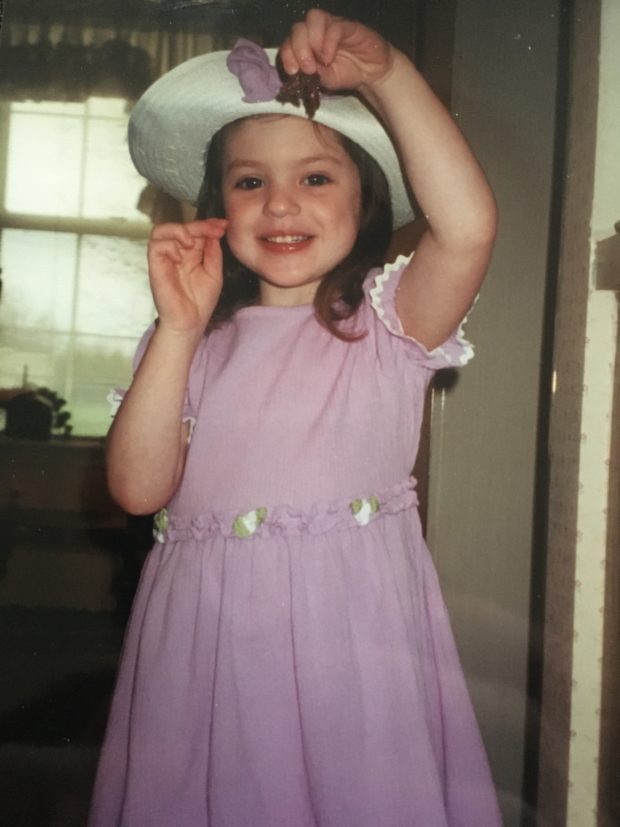
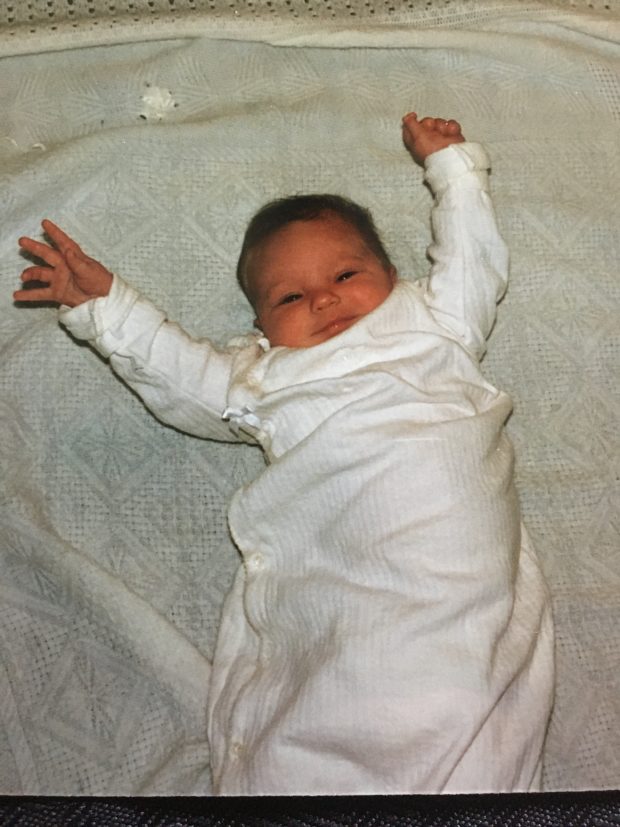
Pierpont has been thinking more lately about the meaning of baptism. Water washing away worldly sin, the act reminding those who partake that God invites them to an afterlife in heaven. On Easter he’s hoping to baptize people over Zoom. The recorded rite would then be featured during the church’s service. He thinks it’s a small way to remind people of the hope God offers even in difficult times.
While sitting at his kitchen table in front of the banana plant his wife got from Costco, Pierpont hopes to recite a blessing over Zoom as congregants dunk themselves in a body of water at their home, preferably a hot tub. Bathtubs could work too, though he confessed, “I don’t know I feel a little weird about the bathtub thing.”
Though I’m not particularly religious anymore, there’s something comforting during this time about returning to the church where I grew up, now by live stream in my East Harlem apartment. I’m stuck between needing to find meaning in this moment and wondering if I can. But I’m discovering, perhaps in an effort to etch some semblance of normalcy, moments of peace in reconnecting with a familiar community from afar.
One that I’d lost touch with until this pandemic.
Returning to church, I’m remembering that feeling of communion I had sitting at those hot tub baptisms of my youth. Cheering in chaotic unison for people as they cry and stumble off-stage smiling produces a connection that’s difficult to describe.
It’s easy for me to imagine the absurdity of it all to an outside eye—God being present in a hot tub on the pulpit of a warehouse-style church nestled in Midwestern woods. Now maybe even a clawfoot bathtub at someone’s home.
But in these moments of baptism, my church celebrates the idea that the people around us might find release and respite from the mortal world, a place where disease is real and no water can easily wash it away. As we watch the baptisms this Easter, there’s newfound hope that we might feel ourselves uplifted, too.
And, perhaps some congregants, like me, will find a much needed and special kind of levity that only comes from thinking about Jesus administering divine rescue via a Jacuzzi.
Community Never Dies, it Just Evolves
Community Never Dies, it Just Evolves
Esohe Osabuohien | eco2132@columbia.edu
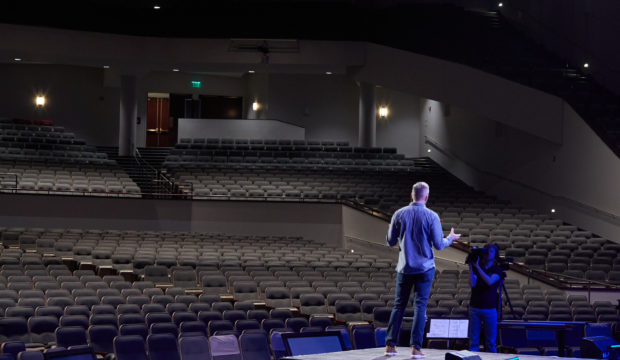
Attending church online was not a new concept for me. Many of the mega churches back home would conduct online services with the option to stream via their websites or Facebook. Even my church home, Russell Street Missionary Baptist, a relatively small Detroit based church with a congregation of about 50 adults over the age of 65 and their grandchildren, would stream service through Facebook live for members to tune into from the comfort of their homes.
However, what was new to me was the need to tune into service frequently.
Before moving to New York, I might have watched our streaming services once or twice; video lag would often keep me from enjoying the Word. Nevertheless, I would always connect to my faith in some other shape or form be it: reading my Daily Devotional on the Bible app, listening to religious and spiritual podcasts, reading a religious WhatsApp message from Nigerian Aunties, or just listening to gospel music. But, since moving to New York City and starting grad school, I must admit that I had fallen off with keeping my faith.
In the last nine months I had gone to church four times, once in September 2019 when I was trying to find a new church home in New York City, once in January 2020 when I went back home to Detroit, and twice in February for reporting assignments. My Bible app and WhatsApp messages went unopened, taking my 362-day reading streak in the Bible app back down to day one. I rarely felt inclined to tune into church service be it through my church’s Facebook live, listening to Bishop T.D. Jakes’ podcast, or attending the virtual service of another popular Detroit based church.
I felt as though God knew my heart. I was still a member of the flock, following and trying to lead by example, but I was also busy.
However, this all changed in March. As the novel Coronavirus (COVID-19) started sweeping through the nation, I felt the need to reconnect.
On Sunday March 15, I attempted to tune into my church’s Facebook livestream, the lag bothered me so I tried a different service and called my mom to see if she was tuned in as well. She was. She was also trying to help my 91-year old grandmother who lives alone and does not have a smartphone, but knows all about what’s trending on Facebook and social media listen in. Despite some technical difficulties, we were connected. On Tuesday of that same week, I tuned into an Instagram live tarot reading hosted by TatiannaTarot, a New Orleans based Diviner, spiritualist and Iyanifa – a priestess of the Yoruba tradition. I wanted to see if she had any messages for the week, or anyone I could connect to for follow-up on my story about followers of the Yoruba tradition. During her four-hour or more session, there were at least 500 people tuned in and asking questions or seeking guidance from either her or their ancestors, she responded and gave a reading for almost every question.
Both the Sunday service with my family, and her reading gave me something that I had been missing for a while, spiritual restoration and a globalized sense of community.

